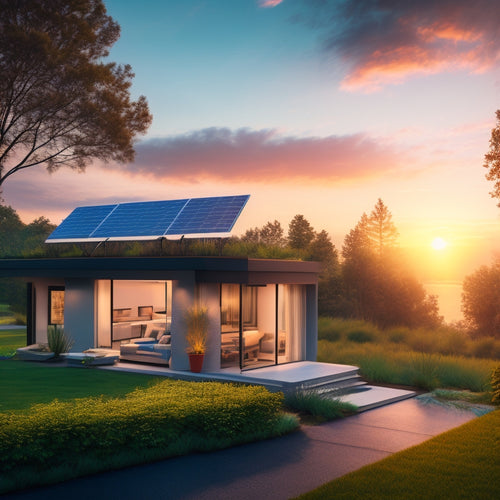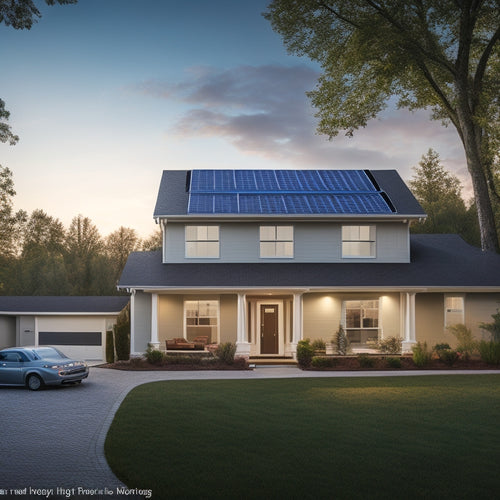
Seamless Solar Panel Installation in 5 Steps
Share
To achieve seamless solar panel installation, start by evaluating your current and future energy needs. Next, research local tax incentives and rebates to maximize your savings. Choose modern, efficient solar technology for peak performance. Then, prepare for the installation by ensuring your home is ready for the setup. Finally, partner with a qualified installer who employs advanced techniques for a quick and efficient process. Following these steps not only enhances your energy independence but also elevates your property value. There's more to learn about how a solar investment can change your energy consumption.
At a Glance
- Assess your current and future energy needs to determine the appropriate solar system size for your home.
- Research available tax incentives and rebates to lower your upfront solar installation costs.
- Choose modern, efficient solar technology to maximize energy output and savings.
- Opt for advanced installation techniques to streamline the setup process and reduce labor costs.
- Monitor and adjust your energy consumption to ensure optimal performance and long-term benefits from your solar investment.
Cost-Effective Energy Solution
Switching to solar panels isn't just an eco-friendly choice; it's a smart financial move for your future.
With the potential for significant long-term savings on your energy bills and available tax incentives, you can make a solid investment that pays off over time.
Let's investigate how you can maximize these benefits for your home.
Long-Term Savings Potential
Investing in solar panels offers an engaging path to long-term savings, altering your energy costs into predictable, manageable expenses. By utilizing the sun's power, you convert your home into a self-sufficient energy source, minimizing reliance on fluctuating utility rates.
This solar investment not only reduces monthly bills but also enhances your property's value, making it a financially savvy choice.
When you integrate solar into your financial planning, you're not just investing in technology; you're investing in your future. Over time, the cost of solar energy becomes considerably lower than traditional sources, especially as energy prices rise.
You'll enjoy the freedom of knowing that your energy expenses are set, allowing you to budget more effectively.
Moreover, the longevity of solar panels—often exceeding 25 years—means that you'll benefit from years of reduced costs, with many homeowners seeing a full return on their investment within a decade.
Embracing solar energy enables you to take control of your energy needs, leading to substantial long-term savings and increased financial independence.
In a world of unpredictable energy prices, going solar is a smart choice for lasting economic security.
Tax Incentives Available
Numerous tax incentives make solar energy an even more attractive option, enhancing its cost-effectiveness. When you invest in solar panels, you can take advantage of federal tax credits, which allow you to deduct a significant percentage of your installation costs from your federal taxes. This means that not only do you reduce your overall expenditure, but you also expedite your return on investment.
In addition to federal incentives, many states offer their own tax credits and rebates, further increasing your financial benefits. These local programs can vary widely, so it's crucial to research the specific incentives available in your area. By combining these financial perks, you can dramatically lower the upfront costs associated with solar installation.
Moreover, you might find that your local utility company provides additional incentives, such as rebates for energy efficiency improvements or performance-based incentives for the energy your system produces.
Environmental Impact Reduction
By installing solar panels, you greatly lower your carbon footprint, contributing to a cleaner environment.
This renewable energy source not only reduces reliance on fossil fuels but also promotes sustainable energy practices.
Investing in solar can lead to considerable energy savings while also providing a pathway to energy independence.
Embracing solar technology helps you make a tangible impact on reducing greenhouse gas emissions.
Lower Carbon Footprint
Shifting to solar energy considerably lowers your carbon footprint, contributing to a substantial reduction in greenhouse gas emissions. By adopting solar power, you're not just making an eco-friendly choice; you're embracing sustainable practices that promote a healthier planet for future generations.
Consider the impact of your switch to solar energy:
| Action | Carbon Emissions Reduction |
|---|---|
| Install Solar Panels | Up to 4 tons per year |
| Use Solar Water Heating | Up to 3 tons per year |
| Power Your Home with Solar | Up to 6 tons per year |
When you utilize the sun's energy, you effectively reduce reliance on fossil fuels, which are significant contributors to climate change. Each panel installed is a step toward freedom from traditional energy sources and the harmful emissions they produce. By prioritizing solar, you're not just enhancing your energy independence; you're also committing to a lifestyle that values sustainability.
Every eco-friendly choice you make today paves the way for a cleaner, greener tomorrow. So take the leap and join the movement toward reducing our collective carbon footprint. Your actions matter!
Renewable Energy Benefits
Utilizing renewable energy not only promotes sustainability but also greatly reduces environmental impacts. By utilizing renewable sources like solar, wind, and hydro, you're actively cutting down greenhouse gas emissions that contribute to climate change. This shift helps maintain air quality, protects ecosystems, and conserves water resources, which are essential for life.
Moreover, embracing renewable energy encourages energy independence. When you invest in solar panels, you're less reliant on fossil fuels and the volatile markets that accompany them. This independence means you can generate your own energy, leading to reduced electricity bills and greater financial stability. You're no longer at the mercy of rising energy costs or geopolitical tensions that can disrupt supply chains.
As you consider solar panel installation, think about the broader impact of your choices. By opting for renewable energy, you're not just making a personal investment; you're contributing to a healthier planet for future generations.
This commitment to using clean energy strengthens you and your community, setting the stage for a sustainable and resilient future. In this way, embracing renewable energy isn't just a choice; it's a revolutionary step towards freedom from traditional energy constraints.
Innovative Technology Advantages
Innovative technology in solar panel systems offers you enhanced energy efficiency, maximizing your energy output and savings.
With features like smart charging and compatibility with existing systems, you can optimize your energy use and minimize costs.
With streamlined installation processes, you'll experience quicker setup times and reduced labor costs.
Embracing these advancements not only benefits your wallet but also contributes to a sustainable future, making it easier to achieve energy independence.
Enhanced Energy Efficiency
How can enhanced energy efficiency change your approach to solar power? When you adopt state-of-the-art solar technology, you're not just investing in panels; you're investing in superior energy performance.
Modern solar systems deliver impressive efficiency metrics that translate into more energy harvested from sunlight, maximizing your return on investment.
With innovations like bifacial panels and advanced inverters, you can capture more sunlight and convert it into usable power. This means reduced reliance on grid energy, leading to significant savings on your utility bills.
Imagine generating enough energy to power your home and possibly sell excess energy back to the grid.
Moreover, enhanced energy efficiency contributes to a sustainable lifestyle, aligning with your desire for freedom from traditional energy sources. By utilizing solar power effectively, you're equipping yourself while reducing your carbon footprint.
The technology has evolved to guarantee that you get the most out of every ray of sunlight, giving you control over your energy production and consumption.
Streamlined Installation Process
When it comes to solar panel installation, the right technology can make all the difference in streamlining the process. Innovative tools and techniques drastically reduce your installation timeline, allowing you to utilize solar energy sooner. By utilizing advanced mounting systems and pre-wired panels, you can eliminate many common installation challenges.
These technologies not only simplify the setup but also enhance efficiency, guaranteeing every component works seamlessly together. Imagine avoiding the headaches of manual adjustments and complicated wiring while enjoying a faster path to energy independence. With streamlined processes, you can focus on what matters most—reaping the benefits of clean, renewable energy.
Moreover, using state-of-the-art software for project management can keep your installation on track, providing real-time updates and facilitating communication between installers and homeowners. This transparency cultivates trust and guarantees that any potential issues are addressed quickly, further minimizing delays.
Incorporating these innovative technologies not only accelerates your progress to solar power but also enables you to take control of your energy future. Welcome the freedom and efficiency that comes with a seamless solar panel installation—your path to a sustainable lifestyle starts here.
Assess Your Energy Requirements
To maximize the benefits of solar panel installation, you first need to determine your current energy consumption.
By understanding how much energy you use now, you can also identify any future energy needs as your household or business grows. This assessment is essential in ensuring your solar system is adequately sized to meet both present and future demands.
Additionally, implementing energy-efficient upgrades, such as LED bulbs, can greatly enhance your energy savings and reduce overall consumption, making your solar investment even more effective assess daily energy requirements.
Determine Energy Consumption
Understanding your energy consumption is vital for determining the right solar panel system for your home. To start, conduct an energy audit to analyze your current energy use. This process involves reviewing your utility bills and identifying your typical monthly usage patterns. By gathering this data, you can pinpoint which appliances and systems consume the most electricity and recognize any areas where you might reduce usage.
Next, consider your lifestyle. Do you work from home? Do you have a growing family? These factors will influence your energy needs, and it's essential to account for them.
Once you've completed the audit, calculate your average daily energy consumption in kilowatt-hours (kWh). This number will help you determine how many solar panels you'll need to meet your energy demands effectively.
Also, think about peak sunlight hours in your area, as they impact the efficiency of your solar system. By understanding your energy consumption, you enable yourself to make informed decisions that enhance your energy independence.
With the right information, you can adopt a sustainable energy future that offers you freedom from rising utility costs.
Identify Future Energy Needs
Evaluating your future energy needs is crucial for ensuring your solar panel system remains effective over time. As you consider the investment in solar technology, think beyond your current consumption.
Energy forecasting is essential for identifying future trends that could impact your energy requirements, such as lifestyle changes, family growth, or the addition of electric vehicles.
Begin by reviewing how your energy usage might evolve. Are you planning to work from home more often? Will you be purchasing new appliances or adding smart home technologies? These factors can greatly influence your energy consumption.
Additionally, consider local regulations and incentives that might encourage further energy efficiency or renewable energy use. Understanding these future trends allows you to size your solar panel system appropriately, ensuring it meets your energy needs without falling short.
Long-Term Savings Potential
When you install solar panels, you're not just embracing renewable energy; you're also setting yourself up for significant long-term savings.
Reduced Energy Bills
By investing in solar panel installation, you're not just utilizing renewable energy; you're also setting the stage for significant long-term savings on your energy bills. As utility rates continue to rise, your newfound energy efficiency can provide you with a sense of freedom from escalating costs.
Consider this breakdown of potential savings over the years:
| Year | Average Savings | Cumulative Savings |
|---|---|---|
| 1 | $1,000 | $1,000 |
| 2 | $1,050 | $2,050 |
| 3 | $1,100 | $3,150 |
| 4 | $1,150 | $4,300 |
These figures illustrate how quickly your investment can pay off, reducing your reliance on traditional energy sources. As you utilize the power of the sun, you'll not only lower your bills but also contribute to a more sustainable future. It's about taking control of your financial destiny while promoting energy independence. Accept the freedom that comes with solar energy—start experiencing the benefits of reduced energy costs today, and watch your savings grow year after year.
Frequently Asked Questions
How Long Does the Solar Panel Installation Process Typically Take?
The solar panel installation process typically takes one to three days, depending on your installation timeline and preparation. Proper planning can streamline the process, ensuring your shift to solar energy is smooth and efficient.
What Permits Are Required for Solar Panel Installation?
You'll need to check local regulations for necessary permits before installation. These can affect installation costs, so understanding requirements upfront helps you budget effectively and guarantees a smooth process, maximizing your freedom with solar energy.
Can I Install Solar Panels Myself?
Certainly, you can install solar panels yourself, but think twice! DIY considerations are crucial. Make certain you know safety precautions to avoid accidents and guarantee efficiency. Enable yourself, but don't overlook the risks involved!
What Happens During Bad Weather on Installation Day?
During bad weather on installation day, you should prioritize safety precautions. Expect possible weather delays, as conditions can compromise both your safety and the installation quality. It's crucial to wait for favorable conditions to proceed confidently.
Are Solar Panels Suitable for All Types of Roofs?
Not all roof types are created equal. While many roofs support solar panel installation, some may face compatibility challenges. You'll want to take into account materials and angles to guarantee ideal performance and energy independence.
Explore More
In wrapping up your expedition toward seamless solar panel installation, you're not just making an investment; you're embracing a brighter, more sustainable future. By utilizing innovative technology and evaluating your energy needs, you're setting the stage for long-term savings that gently lighten your utility bills. As you step into this eco-friendly solution, you're not merely reducing your environmental footprint; you're charting the course for a cleaner planet, all while enjoying the benefits of renewable energy.
Related Posts
-

Best Solar Powered Flashlights for Emergency Situations
When you're choosing the best solar-powered flashlights for emergency situations, focus on their brightness, battery ...
-

The Future of Residential Energy Storage
The future of residential energy storage looks promising and cost-effective for you. With lithium-ion battery prices ...
-

Cost of Solar With Battery Backup
You're investing in a solar panel system with battery backup to guarantee reliable power during outages. The cost of ...


